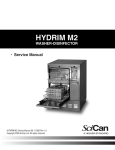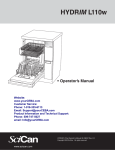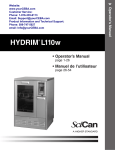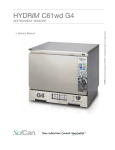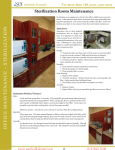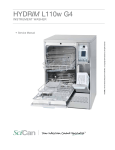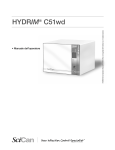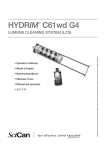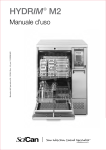Download HYDRIM®C51w
Transcript
HYDRIM C51w ® • Service Manual HYDRIM C51w Service Manual 96-110105 Rev 1.0 Copyright 2007 SciCan Ltd. All rights reserved. Table of Contents 1. 1.1 1.2 1.3 1.4 1.5 Introduction ..................................... Page 2 Overview Specifications Safety Information Tools & Hardware Shipping Instructions 2. 2.1 2.2 2.3 2.4 2.5 2.6 2.7 2.8 2.9 2.10 Installation ........................................Page 6 Pre-Installation Tools and Supplies Required Installation Options Connecting The Water Inlet Hoses Drain Requirements Levelling the Hydrim Installing Cleaning Solution Setting Water Softener Installation Test Printer / USB Setup 3. Routine Maintenance ..................... Page 12 3.1 Filter Maintenance 3.2 Wash Arm Maintenance 4. 4.1 4.2 4.3 4.4 4.5 4.6 Unit Overview ..................................Page 13 The Unit At A Glance Removing The Top Cover Removing The Bottom Pan and Kickplate Removing The Chemical Bracket Removing The Controller Removing The Door Fascia 5. Electrical Schematic .......................Page 18 6. Technical Service Menu .................Page 19 7. 7.1 7.2 7.3 Troubleshooting ..............................Page 22 Troubleshooting Tools Cycle Faults Additional Troubleshooting 8. Spare Parts......................................Page 30 Manufactured by: SciCan Ltd. 1440 Don Mills Road, Toronto ON M3B 3P9 CANADA Phone: (416) 445-1600 Fax: (416) 445-2727 Toll free: 1-800-667-7733 my my My.SciCan is the private access information network for SciCan employees, SciCan technicians and associated dealers. My.SciCan.com is the one-stop information outlet for all your technical service and overall SciCan product needs. On the site you will find technical and operator manuals, technical bulletins, product artwork, and brochures. As a registered user, you will receive frequent product updates to make sure you have all the latest news and information from SciCan. Join by registering at: http://my.scican.com/ For all service and repair inquiries: Canada: 1-800-870-7777 EU: +49 (0) 821 5674 56-0 International: 1-416-445-1600 United States: 1-800-572-1211 Email: [email protected] SciCan Inc. 701 Technology Drive Canonsburg, PA 15317 USA Phone: (724) 820-1600 Fax: (724) 820-1479 Toll free: 1-800-572-1211 SciCan Medtech Alpenstrasse 16, 6300 Zug SWITZERLAND Phone: (41-41) 727-70-27 Fax: (41-41) 727-70-29 EU Representative: SciCan GmbH Kurzes Geländ 10 D-86156 Augsburg Phone: +49 (0) 821 56 74 56-0 Fax: +49 (0) 821 56 74 56-01 Copyright 2007 SciCan Ltd. All rights reserved. HYDRIM is a registered trademark of SciCan Ltd. Page 1 1. Introduction 1.1 Overview This guide provides instructions for the servicing and repair of the Hydrim® C51w Instrument Washer. Every attempt has been made to provide accurate, detailed instructions. All servicing of the Hydrim C51w should be done by certified personnel only. All local, provincial, state and national regulations regarding the servicing of the class of device and safety requirements must be observed. Do not permit any person other than certified personnel to supply parts for, service, or maintain a Hydrim C51w. SciCan shall not be liable for incidental, special or consequential damages caused by any maintenance or services performed on the Hydrim C51w by a third party, including lost profits, any commercial loss, economic loss, or loss arising from personal injury. The Hydrim C51w Instrument Washer should only be installed and serviced by a qualified contractor as it is an Installation Category 2 device.The contractor should be experienced in installing equipment that requires electrical hook-up as well as plumbing. Hydrim C51w Cycle Description Chart P1 – Rinse & Hold* P2 – Wash P3 – Heavy Duty Wash Description Use to keep instruments moist when not being washed for 1 hour. Use for moderately soiled loose instruments. Use for heavily soiled instruments and cassettes. Cold Prewash <45ºC / 113ºF <45ºC / 113ºF <45ºC / 113ºF Wash N/A 50ºC / 122ºF 5 minutes 50ºC / 122ºF 9 minutes Rinse 60ºC / 140ºF 60ºC / 140ºF 60ºC/140ºF Dry N/A 1-15 min. 1-15 min. Total Time** without drying 8 minutes 19 minutes 23 minutes Water Consumption 6L / 1.5 gal. 14L / 3.7 gal. 14L / 3.7 gal. * This cycle is not a wash cycle and is not suitable for processing instruments prior to reuse. Always run a wash cycle following the rinse and hold cycle. Page 2 1. Introduction 1.2 Specifications Height: Width: Depth: Depth with door open: Weight: Running Noise: Hot water connection: Water softener: Filling system: Dryer Heater Wash temperature: Electrical Rating: Equipment pollution degree: Equipment Installation Category: Maximum relative humidity: Operating temperature range: Maximum altitude: Mains supply: 475 mm / 18.75" 600 mm / 23.75" 460 mm / 18.25" 780 mm / 30.7" 35 kg / 75lbs 60 dB(A) 50-70°C / 122-158°F 0.5 kg / 1.1lbs. salt capacity 3.5 L safety maximum / 120 U.S Fl. Oz 1kW 50°C / 122°F + / - 5°C / 9° F 208 - 240V 60 Hz 10 A Pollution Degree 2 Installation Category II 80% for temperatures up to 31°C / 88°F 50% for temperatures up to 40°C / 104°F - 5°C to 40°C / 23-104°F 2000 m / 6561.7' + / - 10% of nominal * If hot water temperature is less than 50°C / 122°F, and if the power line is 240V, allow 30 minutes between cycles. Pay close attention to the following symbols that appear on the unit: Caution, a potential hazard to the operator Caution, hot surface Pay close attention to the following symbols that appear in this book. Caution, a potential hazard to the operator Important information Page 3 A situation which may lead to a mechanical failure 1. Introduction 1.3 Safety Information Safe operation The following apply to both operators and service technicians: • Exercise caution and seek assistance when lifting or carrying the unit. • Cleaning solutions may irritate. Avoid contact with eyes and mouth. • Never lean on the open door. The unit may tip forward causing injury. • Always turn the unit OFF before adding softener salt or solutions. Before performing routine maintenance or servicing the unit, turn the unit OFF and unplug the power cord from the power source. • The operator should never remove the cover of the unit or insert objects through holes or openings in the cabinetry. Doing so may damage the unit and/or pose a hazard to the operator. • If the unit is used in a manner other than that specified, the protection provided by the equipment may be impaired. Safe servicing • The Hydrim C51w Instrument Washer should only be installed and serviced by a qualified contractor as it is an Installation Category 2 device. SciCan shall not be liable for incidental, special or consequential damages caused by any maintenance or services performed on the Hydrim C51w by a third party or for the use of equipment or parts manufactured by a third party, including lost profits, any commercial loss, economic loss, or loss arising from personal injury. • All local, regional, state, and national regulations regarding the servicing of this class of device and safety requirements must be observed. When the cover is removed: • Hazardous voltages are accessible. Disconnect the power cord before removing the cover. • Sharp metal edges are exposed. Be careful, and wear long sleeves and gloves. • A dielectric strength test (hi-pot) must be performed on the unit if parts associated with the power main are serviced or replaced. • A protective bonding impedance test (ground continuity) must be performed on the unit if components of the protective earthing system are changed or if connections are broken and remade. Power main Ground Page 4 1. Introduction Reporting • It is vital for SciCan to learn of any problem in the field. This information will help SciCan solve the problem quickly and improve product reliability in new units. Biological waste • Waste water in the unit may contain biological contaminants; use a mechanical means to siphon the contents. Wear disposable rubber gloves. Dispose of absorbent material according to biological waste disposal regulations. 1.4 Tools & Hardware DESCRIPTION 1. Nose pliers 2.Screwdriver PH1 3. Screwdriver PH2 4. Screwdriver Slot 5.T20 Torxdriver 6. Dental Wedge 7.Wire stripper DESCRIPTION 8.Wire cutter 9. Small screwdriver 10. Nut driver 1/4" 11. Nut driver 5.5 mm 12. Nut driver 7 mm 13. Nut driver 8 mm 14. Nut driver 13 mm DESCRIPTION 15.Wrench 7/16" 16.Wrench 1/4" 17. 11/16" socket 18. Allen key 2.5 mm 19. Mallet 20.Tension Gun The unit contains the following types of hardware: • • • • Phillips pan head self-tapping metal screws Phillips flat head stainless steel machine screws Torx pan head machine screws Torx pan head plastite screws 1.5 Shipping Instructions The unit should be serviced on site. If it is necessary to send the unit back to the dealer, follow these instructions. Before shipping the unit, run the drain pump to remove most of the water from the system. If there is standing water in the chamber, siphon or ladle as much water as possible and use an absorbent cloth to remove the rest. Disconnect and remove the cleaning solution container and then drain the dosing reservoir. Completely screw in the levelling legs. Specify upright, heated, and insured shipping. Page 5 2. Installation 2.1 Pre-Installation The machine must be installed and levelled correctly for the unit to function as described. All electrical work must be carried out by a qualified electrician and in compliance with all local and national electrical codes. North American Voltage/Frequency: 208 - 240V / 60Hz International Voltage/Frequency: 220 - 240V / 50Hz Rated load: 2 kW Circuit breaker: 10 A per phase The electrical outlet should not be located directly behind the unit.The outlet needs to be accessible after the unit is installed. The power cord must be routed away from the back panel and hot water inlet hose. This appliance must be correctly grounded! The manufacturer cannot be held responsible for damage or injury caused by incorrect or missing grounding. • • • The Hydrim unit is heavy (35 kg / 75 lbs.). Exercise caution and obtain assistance when moving it. The Hydrim is equipped with an air gap / anti-suction device to prevent backflow of dirty water into the water supply. No other air gap device is necessary. If you need to extend the water inlet and drain hoses,ensure that you use commercial grade plumbing hose. The maximum length of the drain hose is 3.3 m / 13". 2.2 Tools and Supplies Required to Install the Hydrim • Slot screwdriver • Channellocks Ensure that HIP Cleaning Solution (instrument wash chemical) is available. All other supplies are included with the Hydrim unit. Page 6 2. Installation 2.3 Installation Options Ensure that there is a 75mm / 3" space at the top, rear and both sides of the Hydrim.This will facilitate installation, levelling, service access and air exhaust from the rear of the unit. Do not locate the electrical outlet directly behind the Hydrim, as this is where warm, moist air from the chamber is exhausted. Do not move the Hydrim into place by maneuvering the open wash chamber door.This may cause to door to become misaligned and leak. Installation Option #1 Cabinet / Steri-Centre Figure 1 Installation Option #2 Sliding Shelf Figure 2 Page 7 2. Installation Figure 3 Installation Option #3 Counter Top 475mm / 18.75" 460mm / 18.25" 600m m /23 .75" 2.4 Connecting The Water Inlet Hoses Figure 4 Connect the hot water hose (red) to the hot inlet valve on the Hydrim (indicated by a red dot) and the cold water hose (blue) to the cold water inlet valve on the Hydrim (indicated by a blue dot). The connector with the elbow should be attached to the back of the Hydrim unit. The washer with the screen goes to the water supply connector. Make sure that the inlet valves are free of debris. Hose / Cord Length / Diameter drain hose outlet cold water inlet Max. Distance from inlet / drain Water Pressure (optimal)* hot water inlet Shut-Off Valve Hot Inlet 1.9 m / 6.2' 2cm / 3/4" 1.5 m / 5' 1-10 bar 14.5-145psi Yes Cold Inlet 1.9 m / 6.2' 2cm / 3/4" 1.5 m / 5' 1-10 bar 14.5-145psi Yes 1.5 m / 5' 2cm / 3/4" — — — 1.8 m / 6' AWG 18-3 — — — Drain Electrical *unit will function with water pressure down to 0.5 bar / / 7psi. Page 8 2. Installation 2.5 Drain Requirements Connect the drain hose to the drain outlet.The drain hose can be attached to existing drain lines using a 3.5 cm / 1.5"or larger standpipe / P-trap combination. If the hose is connected directly to the drain line, fittings and adapters should not reduce water flow. The drain hose should be attached to the main drain at a point no more than 1 m/ 3' above the base of the Hydrim. A floor drain is acceptable (check local codes). 2.6 Levelling the Hydrim levelling bubble For the unit to function properly, it will need to be correctly levelled.To level the unit, follow these steps: 1. Adjust the legs underneath the unit. 2. Use the levelling bubble on the top right hand side as a guide. 3. When the bubble is in the centre, the unit is correctly levelled. Figure 5 2.7 Installing Cleaning Solution Ensure that the quick-disconnect cap on the HIP Hydrim Cleaning Solution bottle is tight. Install the bottle, and loosen the screw cap slightly (see Step 4) to prevent formation of a vacuum in the bottle. Step 1 Step 2 Step 3 screw cap Step 4 MAX MIN Figure 6 quick disconnect cap Page 9 2. Installation 2.8 Setting the Water Softener (salt): Hydrim is equipped with a built-in water softening system which needs to be adjusted according to the local water hardness.The Hydrim water test kit includes three water hardness test strips in bags.Take a water sample from the location where the machine will be installed. Open one of the bags and remove the test strip. Dip the strip in the water. Compare the color of the strip with the chart on the back of the bag. Determine the water hardness according to the chart on the water test kit envelope. Power the unit on. Touch the “i” in the lower right hand corner of the sceen. Select “Technician”. Enter 7919 and touch EN. Select “Cycle Settings" and then "Set Regeneration”. Using the up and down arrows, set the water softener regeneration level according to the following table: Hardness – ppm 0 - 180 190 - 400 410 - 540 550 - 890* > 890 Hydrim setting 0 1 2 3 Additional water treatment required * consider using an additional water treatment Pour 0.5 litre / 16oz of water into the water softener by pouring it into the salt container and inserting it into the chamber wall. Add 0.5 kg / 1.1 lbs of water softening salt in the same manner. Screw the salt container tightly into the wall of the chamber. water softener container Figure 7 2.9 Installation Test Turn on the shut-off valves. Run a test cycle, checking for leaks. Page 10 2. Installation 2.10 Printer / USB Setup The Hydrim C51wd has an RS-232 port at the back, and can be used with an external printer or the SciCan Data Logger.The printers in the chart below have been tested with the Hydrim.To add or change a printer or SciCan Data Logger, follow these steps: Turn off the Hydrim and the printer or Data Logger before connecting these devices to the unit. 1. With the printer or Data Logger connected, turn on the Hydrim and press the i to move to the Menu screen. 2. In the Setup menu, select Printer Selection. 3. Select Serial Printer if connecting a printer, or USB Flash/MSD if connecting the SciCan Data Logger. Press the back arrow to return to the Setup Menu. 4. In the Setup Menu, select Baud rate. 5. Select the rate required (refer to chart below for recommended Baud rates). Use the back arrow to return to the Start screen. 6. Now the Hydrim will write its cycle information to the device chosen. Printer Model Serial Port Baud Rate Epson TM-U220D (C31C515603) 9600 Citizen IDP-3110-40 RF 115B 9600 Star Micro SP212FD42-120 9600 Star Micro SP216FD42-120 9600 Star Micro SP512MD42-R 9600 SciCan Data Logger For Mass Storage Device Serial Port Baud Rate 9600 Page 11 3. Routine Maintenance 3.1 Filter Maintenance Inspect the coarse and fine filters daily for debris and clean if necessary. 1. Grasp the handle in the centre of the coarse filter and turn it 90˚ counter-clockwise. (To reinsert the coarse filter, turn the handle clockwise.) coarse filter 2. Remove the coarse filter. 3. Remove the fine filter. 4. Clean both filters by rinsing them with tap water. 5. Re-assemble, ensuring that the coarse filter is locked in place. fine filter Figure 8 3.2 Wash Arm Maintenance upper wash arm Inspect the wash arms weekly for debris and clean if necessary. 1. Open the unit door and remove the wash rack from the unit. fitting 2. Unscrew the upper wash arm plug by turning the fitting at the hub (note: fitting is left threaded). 3. Remove the upper wash arm. Figure 9 4. Using two hands, grasp both ends of the lower wash arm on the underside. 5. Pull the lower wash arm upwards. To remove arm, pull upwards 6. Inspect both sides of the wash arms for debris in the nozzles. Remove the debris where necessary. 7. Rinse both wash arms with tap water and eassemble the wash arms. lower lower wash wash arm arm collar Page 12 Figure 10 4. Unit Overview 4.1 The Unit At A Glance Left Side Right Side manual door release (53) dryer (42) dosing pump (4) quick connect (25) chemical tube (33) drip tray (27) dryer duct (39) dosing reservoir (32) water softener heater (18) Figure 12 door solenoid (62) low circulation pump pressure switch (safety) (19) level sensor Figure 13 lower circulation pump (7) heater (18) capacitor valves (hot and cold) (12, 22) temperature sensor (54) door lock Tubing, top arm fitting (64) upper circulation pump (8) Figure 14 Top View drain Pump (9) top arm fitting (65) drain connection Page 13 Bottom View float water softener Figure 15 4. Unit Overview 4.2 Removing The Top Cover Figure 16a To remove the top cover, follow these steps: 1. Power OFF the unit, and unplug. 2. Remove the screws that secure the top cover: • 2 screws and white caps on the right side of the cover (Figure 16a). • 2 screws and white caps on the left of the cover (not shown). • 7 Phillips washer screws on the back of the cover: (1 on the top, 3 on the right, 3 on the left.) (Figure 16b) • 2 screws and caps Rear Of The Unit Figure 16b 6 Phillips flat head machine screws on the inside front of the unit (4 on the top, 2 on the left) (Figure 16c).The two screws on the right side do not secure the top cover and do not need to be removed. 3. Grasp the left and right sides of the cover. Pull sides slighty outward and lift straight up. 7 Phillips screws 4. Remove the insulation on the top and sides. 5. When replacing the cover, ensure that the orange cap for the screw under the drip tray is replaced (Figure 16d). Figure 16c Figure 16d 6 Phillips screws Page 14 orange cap 4. Unit Overview 4.3 Removing the Bottom Pan and Kickplate 1. Completely open the front door. 2. Remove the two Torx screws from the kick plate and pull the kick plate forward to remove (Figure 17a). 3. Drain water from the unit and drain the chemical from the reservoir. Figure 17a 4. Turn the unit upside down. Please note that some liquid will remain. Torx screws 5. Remove one Phillips and one Torx screw from the bottom of the chemical bracket (Figure 17b). Screw Figure 17b 6. Remove the two Phillips screws connecting the back panel to the bottom pan (not shown). 7. Remove four Torx screws keeping the bottom pan in place (not shown). 8. Remove the bottom pan. Caution! Edges are sharp. 9. Be careful not to damage the bottom pan overflow float and make sure it is in place before reinstalling bottom pan. Screw 4.4 Removing the Chemical Bracket 1. Power the unit OFF. Screw 2. Remove the top cover. Torx Screw 3. Remove the Phillips screws as shown (Figure 17b). 4. Remove the three screws in the backpanel holding the chemical bracket. 5. Remove the screw on top of the door bracket (Figure 17c). Figure 17d Figure 17c 6. Pull chemical bracket away from the machine, loosen clip and disconnect the dryer hose. 7. This provides access to the chamber full switch (black) and the overflow switch (clear) (Figure 17d). Door Bracket Screw Page 15 chamber full switch overflow switch 4. Unit Overview 4.5 Removing the Controller Assembly 1. Remove the top cover. 2. Remove the two screws on the left of the chemical bracket and the screw on top that holds the bracket to the door latch bar (Figure 18a and b). screws 3. Remove the two screws that hold the fascia to the chamber (Figure 18c). 4. Pull chemical bracket away and swing fasica out as shown (Figure 18d). Figure 18a 5. Access the controller assembly and disconnect the following connectors from the i/o board: J6 – one 4-pin connector J3 and J5 – two 6-pin connectors J2 and J1 – two 2-pin connectors J7 – one 2-pin connector screw screws Figure 18b J2 J1 J3 Figure 18c 2 1 J6 Figure 18e Figure 18d Page 16 J7 signal J5 connector 4. Unit Overview J2 6. Disconnect the signal connector from the bottom of the logic board (Figure 18e). J1 J3 7. Unclip the temperature sensor junction block (not shown). 8. Remove four screws (Figure 18f) and lift I/O board off. screws 9. Disconnect the printer cable from the side of the logic board (Figure 18g). 10. To remove logic board, remove upper standoffs and two screws (Figure 18g). J6 11. Reassemble in reverse order. Figure 18f J7 J5 printer cable standoffs screws Figure 18g 4.6 Removing The Door Fascia To remove the door fascia, follow these steps: 1. Power OFF the unit and unplug. 2. Open the door and remove the 4 Phillips screws on the perimeter of the door’s inside face. 3. Pull the door fascia towards you and lift up. Figure 19 screws Page 17 5. Electrical Schematic Page 18 6. Technical Service Menu Service Menu Overview Cycle Count Diagnostic Tools Cycle Settings • Error History • View IO Set Up • Component Test • Set debug screen Printer Selection Baud Rate Factory Repeater Production Default Mode Tools • Set Drying Time • Set Regeneration • Chemical set-up • Set Wash Time • Set Rinse Time • # Extra Rinses • Set Wash Temperature • Last Rinse Temp Software Upgrade • Prod.Test Cycle 1 • Prod.Test Cycle 2 • Water Adjustment To access this menu, turn the unit on.There is an "i" in the lower right hand corner of the screen for about 10 seonds.Touch the "i" to get to the menu screen.Touch Technician. Key in the password 7919 and press EN. Cycle Count: Displays the number of cycles that have been run (complete and incomplete). Diagnostic Tools: Offers a submenu of five tools. Error History: Allows access to the last three errors. Component Test: Allows individual testing of the following components. Circ. Pump M1 (Upper & Lower) - ON/OFF All Devices - OFF Latch L1 - ON/OFF Salt Valve Y2 - ON/OFF Dosing Pump 1 M4 - ON/OFF Dryer Motor + Heater - ON/OFF Hot W.Valve Y7- ON/OFF Cold W.Valve Y1 - ON/OFF Rinse Aid Valve ON/OFF (not used) Waste Pump M2 - ON/OFF Page 19 6. Technical Service Menu View IO Status: Shows the status of the each component in the unit Chamber Full SW - ON/OFF (chamber full switch) Chemical Sensor - ON/OFF Chamber Overflow ON/OFF Door SW ON/OFF (Door switch) Chamber T - XX C (chamber temperature) CTS - ON/OFF (clear to send to printer/ datalogger) Set debug screen: Shows I/O status when cycle is running Cycle Settings Set Drying Time P1 - Rinse (N/A) P2 - Wash 10 min P3 - HD Wash 10 min (choose from 1 to 15 min) (choose from 1 to 15 min) Set Regeneration – Sets water softener setting 0 (choose from 0 to 3) Chemical Set-up Prewash 4s (choose from 0 to 15s) Wash 13s (choose from 0 to 30s) High Temp.Wash (second part of wash phase) 13s (choose from 0 to 30s) Rinse 8s (choose from 0 to 15s) Set Wash Time P1 Rinse (N/A) P2 Wash 5 min P3 HD Wash 9 min (choose from 2 to 9 min) (choose from 2 to 9 min) Page 20 6. Technical Service Menu Set Rinse Time P1 Rinse 1 min P2 Wash 1 min P3 HD Wash 1 min (choose from 1 to 5 min) (choose from 1 to 5 min) (choose from 1 to 5 min) # Extra Rinses P1 Rinse N/A P2 Wash 0 (choose from 0 to 4) P3 HD Wash 0 (choose from 0 to 4) Set Wash Temperature P1 Rinse (N/A) P2 Wash 50˚C (choose from 45 to 50˚C) P3 HD Wash 50˚C (choose from 45 to 50˚C) Last Rinse Temp. P1 Rinse N/A P2 Wash 60˚C (choose from 45 to 60˚C) P3 HD Wash (choose from 45 to 60) Printer Selection Serial Printer (default) USB Flash/MSD Baud Rate 1200 2400 4800 9600 (default) Factory Default (resets all values to factory default) Reset Repeater Mode (in the ON position, the unit will continuously run the selected cycle) ON/OFF Production Tools (used in production only) Software Upgrade: to upgrade software via the Datalogger Page 21 7. Troubleshooting 7.1 Troubleshooting Tools Within the technical service menu, there are several useful tools for troubleshooting. Debug screen: Time remaining in cycle This screen should be used when running a cycle to view the I/O status of components. Outputs: Cold water valve is OFF (closed) Hot water valve is ON (open) Circulation pumps are ON Chamber Heater is OFF Dryer motor is OFF Dryer heater is OFF Drain pump is OFF Salt valve is OFF Dosing pump is OFF P3 HD PRE WASH 38 min Chm T 39˚C Chm FULL=OFF DetSW=ON Chm OVER=OFF Door=CLSD ColdV=OFF HotV= ON CircPUMP=ON ChmHeater=OFF DryerMotor=OFF DryerHeater=OFF DrainPump=OFF Dosing=OFF SaltV=OFF Inputs: Chamber Temperature is 39C (main sensor) Chamber Full Switch: OFF (unit is still filling) Chamber overflow switch is OFF Door latch is closed Detergent switch is ON (there is enough chemical for dosing) View I/O status This screen should be used when testing components and wires for functionality without the cycle running. Page 22 7. Troubleshooting 7.2 Cycle Faults P1 Rinse If the software detects an error, an error message will appear on the screen showing one of the codes listed below. Instruments Not Processed CF3 TEMP. SENSOR 1 BAD OK 7.2.1 CF1 Heating Failure Detection:The water is not reaching the required temperature in the specified time. Remedy: upper circulation pump hot and cold valves drain connection fuses 1. Possible Cause is overheating of the circulation pump. Indication of this cause is if the machine gives CF1 error code float during a cycle, but runs normally if the machine is allowed to cool down. If OK, water proceed to step 2. softener 2. Check the fuses. If OK, proceed to step 3. 3.With the troubleshooting window in place, start a cycle. After filling, the water level should be approximately 10-15mm below the lower wash arm. If the water level is not correct, replace the level sensor (Figure 21). If the water level is OK, proceed to step 4. lower circulation pump pressure switch (safety) heater heater element lower circulation pump Figure 20 drain pump temp. sensor capacitor chamber full switch level sensor Figure 21 Page 23 chamber overflow switch 7. Troubleshooting 4. Using the debug screen and with the troubleshooting window in place, count the rpm's when the temperature is at 50˚C. Upper and lower arm rpm's should be >= 25. If rpm's are low, this indicates circulation pump failure. Replace the appropriate circulation pump (upper or lower). If rpm's are OK, proceed to step 5. 5. There is a failure in one of the following • thermostat • pressure switch (lower wash arm) • heater element Remove the top cover and the bottom cover. Check the heater element, lower arm pressure switch and thermostat (in series). 7.2.2 CF2 Chamber Filling Failure Detection: • Chamber full switch not activated in the first 4 min of filling (circulation pump not running yet). If hot water unavailable or at low pressure, the unit will switch to cold water after 2.5 min if the chamber full switch is not activated. • Chamber full switch not activated in 4 min of filling with circulation pump running. Remedy: 1. Check if the water supply valves are turned on and the water pressure is normal. level sensor chamber full switch 2. Check for blockages in the water inlet hose filters. 3. Check for kinks in the water inlet hoses. 4. Possible cause is a malfunction of the chamber level switch. Using the debug screen, monitor if the chamber full switch turns ON after filling. If not, remove the top cover and the chemical bracket. Check the level diaphragm / switch assembly and repair or replace. If OK, proceed to step 5. 5. Possible cause is a leak. Remove the kick plate and look for fluid in the pan. Isolate and repair the source of the leak. Page 24 Figure 22 chamber overflow switch 7. Troubleshooting 7.2.3 CF3 Chamber temperature sensor reading failure Detection: Main temperature sensor readings are outside limits (too high or too low) Remedy: 1. Possible cause is disconnection of the temperature sensor. Check the connection of the sensor to the logic board (see section 4.5 Removing the Controller Assembly). If OK proceed to step 2. 2. Possible cause is malfunction of the temperature sensor. Remove the kick plate. Replace the temperature sensor as required. temperature sensor Figure 23 7.2.4 CF 4 Water evacuation failure Detection: Chamber full switch did not open in 1 minute after turning the drain pump on. Figure 24a Remedy: 1. Check for a kink or blockage in the drain hose. 2. Possible cause is chamber full switch failure. Using the debug screen, check if the chamber full switch is OFF when water had drained drain from the chamber. If not, remove the top pump cover and the chemical bracket. Check the level diaphragm / switch assembly and replace as necessary (Figure 24b). 3. Possible cause is drain pump failure. level Manually load 3 litres of water into the sensor chamber.With the troubleshooting window in place, go into the service menu and activate the drain pump.The water should drain within 20 seconds. If it does not, remove the top and bottom covers and replace the drain pump (Figure 24a). If the water drains ok, proceed to step 3. chamber full switch Page 25 Figure 24b chamber overflow switch 7. Troubleshooting 7.2.5 CF 9 Program Timeout Detection: The unit is running a cycle for more than 3hrs. Remedy: Possible cause is a defective PCB and/or software failure. Replace the logic board. 7.2.6 CF 15 Chamber Overflow Detection: The overflow switch did not turn off after 30sec of running the drain pump. Remedy: 1. Check for a kink or blockage in the drain hose. 2. Possible cause is a defective overflow switch. Follow the procedure for CF2. 3. Possible cause is the water inlet valves not closing.This can be detected if water continues to fill the chamber even when the power to the machine is off. Replace the inlet valves. 4. Possible cause is a leak. Remove the top cover and kick plate and look for fluid in the pan. Isolate and repair the source of the leak. level sensor chamber overflow switch chamber full switch Figure 26 Page 26 7. Troubleshooting 7.3 Additional Troubleshooting Problem: “No detergent” message Remedy 1. Check if the cleaning solution bottle is empty. Replace if required. 2. Loosen the white cap on the cleaning solution bottle to prevent formation of a vacuum (Figure 27). 3. Possible cause is a dosing reservoir malfunction. Remove the top cover. Remove two small, red wires from the connector block and connect them together (Figure 28). If the “no detergent” message disappears and the machine runs, the dosing reservoir is defective and must be replaced (Figure 28). If the error message remains, proceed to step 4. 4. Check the connections to the controller. If the wires are OK, replace the controller logic board. white cap Figure 27 Figure 28 dosing reservoir Page 27 7. Troubleshooting Problem: Cleaning solution leakage Male and Female Connectors Remedy 1. Ensure that the male outlet on the cleaning solution bottle is tightly closed. 2. Ensure that the male and female connectors have mated. 3. Check the cleaning solution tubing for cracks and leaks. Replace if necessary. Cleaning Solution Tubing Figure 29 Problem: Water leaking from the door (front of the unit) Remedy: 1. Make sure unit is level. 2. Check adjustment on the door latch. Loosen two screws and then slide door latch in or out to adjust. Figure 30 Door Latch Problem: Instruments not dry Remedy: 1. Increase drying time 2. Replace dryer. Dryer Figure 31 Page 28 7. Troubleshooting Problem: Screen doesn't turn on Remedy: 1. Check that the machine is plugged in. 2. Check the power supply (5V and 24V) according to schematic 3. Replace LCD 4. Replace logic board Problem: Door doesn't open Remedy: 1. Check the connector from the I/O board to the latch 2. Check the solenoid and replace if necessary. mechanical link solenoid 3. Check the 24V power supply 4. Check if mechanical link is broken Figure 33 5. Replace the I/O board Problem: Printer will not print Remedy: 1. Ensure that serial printer is selected (set-up menu) 2. Ensure that baud rate is correct Page 29 8. Spare Parts For an updated parts list, please refer to myscican.com Item 1 2 3 4 5 6 7 8 9 10 11 12 13 14 15 16 17 18 19 20 21 22 23 24 25 26 27 28 29 30 31 32 33 34 35 36 37 38 SCICAN # 01-107786S 01-107788S 01-107789S 01-107790S 01-107791S 01-107792S 01-107794S 01-110259S 01-107797S 01-107799S 01-107800S 01-107801S 01-107802S 01-107803S 01-107804S 01-107806S 01-107807S 01-107808S 01-107810S 01-107811S 01-107812S 01-107815S 01-107938S 01-107975S 01-108030S 01-108121S 01-108122S 01-108253S 01-108305S 01-108309S 01-108310S 01-108351S 01-108699S 01-108700S 01-108795S 01-108797S 01-109143S 01-109144S KIT DESCRIPTION Seal Door, J Inlet Hose N.A, J Drain Hose, J Dosing Pump, J Valve Salt Regeneration, J Thermoactuator, J Pump Recirculation Lower Arm, J Pump Upper Arm w/o Fitting, J Drain Pump N.A. 230V, 60Hz, J 2A Fuse, J 10A Fuse, J Inlet Valve Cold Water, J Switch Full Chamber, J Switch Overflow Chamber, J Lower Wash Arm, J Screen Drain, J Filter Drain, J Water Heater, J Switch Pressure Heater, J Door Spring Kit, J Clip Door, J Inlet Valve Hot Water, J Switch Pressure Assy, J Adjustable Feet, J Quick Connect Female, J Cap Quick Disconnect, J Drip Tray, J Reservoir Hydrim Water Test Kit, J/K Kickplate, J Mesh Drain, J Float Dosing Reservoir, J Tube Chem. Fuse Holder, J Plastic Trim Edge, J Support Bracket 1-st Pump Dryer Tubing, J Dryer Fitting, J Page 30 NOTE one hose / kit one hose / kit five fuses / kit ten fuses / kit with mesh ten caps / kit only mesh three parts / kit 8. Spare Parts Item 39 SCICAN # 01-109145S KIT DESCRIPTION Dryer Vent Assy, J 40 95-110104 Operator's Manual, Hydrim C51W, J 41 01-109835S Dryer Assy Hydrim, S 42 01-109834S Seals, Door Bottom Hydrim, S 43 01-107973S Packaging Hydrim C51W, J 44 01-110205S Cover Top, C51W, J 45 01-107809S NC Sensor 46 01-110200S Detergent Door w. Label C51WC51W, J 47 01-110201S Fascia Door w. Label, C51WC51W, J 48 01-109791S Door Curtain Hydrim, S 49 01-109790S Upper Spray Arm Hydrim, S 50 01-109789S Rope, Door Latch, C51W 51 01-110203S Single Temperature Sensor C51W, J 52 01-109785S Touch Display Hydrim, S 53 01-110206S Logic Board Hydrim C51W, J 54 01-109783S I/O Board Hydrim, S 55 01-109782S Power Supply Board, S 56 01-110202S Fascia Controller w/ Label, C51W, J 57 01-109780S Door Solenoid C51WD, S 58 01-110204S Tubing, Upper Arm Fitting, C51W, J 59 01-109776S Top Arm Fitting Hydrim, S 60 01-107787S Inlet Hose Europe, J 61 01-107796S Drain Pump Europe 230V, 50Hz, J Page 31 NOTE 8. Spare Parts 01-107786S Seal Door, J 01-107788S Inlet Hose N.A., J 01-107791S Valve Salt Regeneration, J 01-107799S 2A Fuse, J 01-107794S Pump Recirculation Lower Arm, J 01-110259S Pump Upper Arm w/o Fitting, J 01-107800S 10A Fuse, J 01-107801S Inlet Valve Cold Water, J 01-107804S Lower Wash Arm, J 01-107810S Switch Pressure Heater, J 01-107789S Drain Hose, J 01-107806S Screen Drain, J 01-107812S Clip Door, J 01-107807S Filter Drain, J 01-107815S Inlet Valve Hot Water, J Page 32 01-107790S Dosing Pump, J 01-107797S Drain Pump N.A. 230V, 60Hz, J 01-107803S Switch Overflow Chamber, J 01-107808S Water Heater, J 01-107938S Switch, Pressure Assembly (Chamber Full Switch Assembly) 8. Spare Parts 01-107802S Switch Full Chamber, J 01-108121S Cap Quick Disconnect, J 01-108310S Mesh Drain, J 01-107975S Adjustable Feet, J 01-108122S Drip Tray, J 01-108699S Tube, chemical 01-108309S Kickplate, J 01-108253S Reservoir 01-108351S Float Dosing Reservoir, J 01-108700S Fuse Holder, J 01-109143S Dryer Tubing, J 01-108797S Support Bracket 1-st Pump, J 01-109145S Dryer Vent Assy, J 01-108030S Quick Connect Female, J 01-109776S Top Arm Fitting Hydrim, S 01-110204S Tubing, Upper Arm Fitting, C51W, J Page 33 01-108795S Plastic Trim Edge, J 01-109144S Dryer Fitting, J 8. Spare Parts 01-109782S Power Supply Board, S 01-109780S Door Solenoid C51WD, S 01-109783S I/O Board Hydrim, S 01-109790S Upper Spray Arm Hydrim, S 01-110205S Cover Top, C51W, J 01-110206S Logic Board Hydrim, C51W, J 01-110202S Fascia Controller w/ Label, C51W, J 01-110203S Single Temperature Sensor C51W, J 01-109785S Touch Display Hydrim, S 01-110201S Fascia Door w. Label, C51W, J 01-109789S Rope, Door Latch, C51WD, S 01-107809S NC Sensor 01-110200S Detergent Door w. Label C51W, J 01-107973S Packaging Hydrim C51W, S 01-109834S Seals, Door Bottom Hydrim, S Page 34 01-109835S Dryer Assy Hydrim, S




































